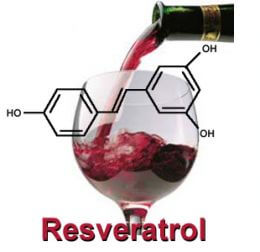Source: Thailand Medical News Jul 29, 2019 6 years, 4 months, 2 weeks, 1 day, 17 hours, 46 minutes ago
Researchers from The University of Buffalo, US and also a team from Xuzhou Medical University in China have jointly discovered that the plant compound resveratrol, which is found in red wine, displays anti-stress effects by blocking the expression of an enzyme related to the control of stress in the brain.

In the US alone, more than 40 million people are affected by depression and anxiety disorders according to data by the Anxiety and Depression Association Of America, (ADAA) while globally the figure stands at more 850 million individuals! These new findings might provide alternatives to current pharmaceutical drugs used to treat these symptoms but are laden with numerous side-effects and dangers. "Resveratrol may be an effective and safer alternative to drugs for treating patients suffering from depression and anxiety disorders," commented Professor Dr Ying Xu, coauthor of the team in an exclusive interview with Thailand Medical News.
The discovery showed how resveratrol impacts neurological processes. Resveratrol, which has been linked to a number of health benefits, is a compound found in the skin and seeds of grapes and berries. While research has identified resveratrol to have antidepressant effects, the compound's relationship to phosphodiesterase 4 (PDE4), an enzyme influenced by the stress hormone corticosterone, until recently was unknown till the findings of this study.
Corticosterone hormone regulates the body's response to stress. Too much stress however, can lead to excessive amounts of the hormone circulating in the brain and, ultimately, the development of depression or other mental disorders. These complex physiological relationships make drug therapy complex. Current antidepressants instead focus on serotonin or noradrenaline function in the brain, but only 28 percent of patients with depression enter full remission in response to these pharmaceutical drugs.
In a study on animal models, the team discovered that the enzyme PDE4, induced by excessive amounts of corticosterone, causes depression and anxiety-like behavior. The enzyme lowers cyclic adenosine monophosphate, a cytokine or messenger molecule that signals physiological changes such as cell division, change, migration and death,in the body, leading to physical alterations in the brain and neurological functions.
Resveratrol displayed neuroprotective effects against corticosterone by inhibiting the expression of PDE4, effectively preventing any negative neurological functions. The research opens the doors for new drug development and treatment protocols involving the use of resveratrol.
As a cautionary advice, although red wine contains resveratrol, consumption of alcohol carries various health risks, including addiction, liver damage and for those with existing health conditions, it might also prove fatal. Always consult your doctor before trying or even changing your consumption or dietary habits or even taking supplements.
Reference: The antidepressant- and anxiolytic-like effects of resveratrol: Involvement of phosphodiesterase-4D inhibition, Pub: Neuropharmacology, Vol 153, Ying Xu, XiaZhu, YongkunLi,XiaoxingYin https://doi.org/10
.1016/j.neuropharm.2019.04.022
